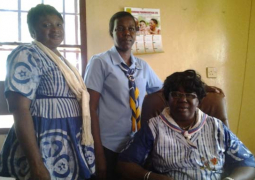PRESENTED
BY MR. MALICK H.B. JALLOW ESQ, LLB (Hons), BL, PDIL
Good
Morning All,
I
now make a presentation in my capacity as a Legal Practitioner and Senior Law
Lecturer, Faculty of law, University of the Gambia. The dominant objective is
to highlight, analyse and critique the law governing the age of criminal
liability in the Gambia. In particular relevant provisions in the Children’s
Act of 2005 and the Criminal Code will be scrutinized and put into context in
light of Gambia’s international legal obligations and accepted international
standards and best practices.
International
Legal Instruments Governing Juvenile Justice in the Gambia
The
Gambia is signatory to the main international legal instruments governing
children’s rights in general and juvenile justice in particular. Principal
among these instruments is the Convention on the rights of the child which the
Gambia ratified on the 8th of august 1990.Specifically Article 40 of the said
convention states that States Parties
recognize the right of every child alleged aas, accused of, or recognized as
having infringed the penal law to be treated in a manner consistent with the
promotion of the child’s sense of dignity and worth, which reinforces the
child’s respect for the human rights and fundamental freedoms of others and
which takes into account the child’s age and the desirability of promoting the
child’s reintegration and the child’s assuming a constructive role in society.
2.
To this end, and having regard to the relevant provisions of international
instruments, States Parties shall, in particular, ensure that:
(a)
No child shall be alleged as, be accused of, or recognized as having infringed
the penal law by reason of acts or omissions that were not prohibited by
national or international law at the time they were committed;
(b)
Every child alleged as or accused of having infringed the penal law has at
least the following guarantees:
(i)
To be presumed innocent until proven guilty according to law;
(ii)
To be informed promptly and directly of the charges against him or her, and, if
appropriate, through his or her parents or legal guardians, and to have legal
or other appropriate assistance in the preparation and presentation of his or
her defence;
(iii)
To have the matter determined without delay by a competent, independent and
impartial authority or judicial body in a fair hearing according to law, in the
presence of legal or other appropriate assistance and, unless it is considered
not to be in the best interest of the child, in particular, taking into account
his or her age or situation, his or her parents or legal guardians;
(iv)
Not to be compelled to give testimony or to confess guilt; to examine or have
examined adverse witnesses and to obtain the participation and examination of
witnesses on his or her behalf under conditions of equality;
(v)
If considered to have infringed the penal law, to have this decision and any
measures imposed in consequence thereof reviewed by a higher competent,
independent and impartial authority or judicial body according to law;
(vi)
To have the free assistance of an interpreter if the child cannot understand or
speak the language used;
(vii)
To have his or her privacy fully respected at all stages of the proceedings.
3.
States Parties shall seek to promote the establishment of laws, procedures,
authorities and institutions specifically applicable to children alleged as,
accused of, or recognized as having infringed the penal law, and, in
particular:
(a)
The establishment of a minimum age below which children shall be presumed not
to have the capacity to infringe the penal law;
(b)
Whenever appropriate and desirable, measures for dealing with such children
without resorting to judicial proceedings, providing that human rights and
legal safeguards are fully respected. 4. A variety of dispositions, such as
care, guidance and supervision orders; counselling; probation; foster care;
education and vocational training programmes and other alternatives to
institutional care shall be available to ensure that children are dealt with in
a manner appropriate to their well-being and proportionate both to their
circumstances and the offence.
Also
relevant is the African Charter on the Rights and Welfare of the Child which
the Gambia ratified on the 14th December 2000
Both
instruments lay down the requisite foundations for a fully-fledged juvenile
justice system and inspired the conceptualisation of the children’s act of
2005.
Brief
Historical Background to Juvenile Justice in the Gambia
The
concept of Juvenile Justice was first championed under the Young Person Act of
1949.This act generally contained progressive provisions that catered for the
Special needs of children in conflict with the law. However there were notable
omissions. E.g. the age of criminal liability was not fixed. The advent of the
children’s Act of 2005 made significant strides as far as bridging the gaps are
concerned and bringing Gambia in full compliance with its international legal
obligations vis-à-vis the CRC and the ACRWC. In particular it established a
children’s court dedicated to the special needs of children in conflict with
the law and also pegged the minimum age of criminal liability to 12 years old.
The relationship between this provision on the minimum age for criminal
liability and corresponding provisions in the criminal code shall form the
basis of our analysis and conclusions for the rest of this paper.
Law
on the Age of Criminal Responsibility
Neither
the CRC nor the ACRWC expressly provide for a minimum age of criminal
liability. However Article 40.3 of the CRC enjoins the establishment of a
minimum age below which children shall be presumed not to have the capacity to
infringe the penal law. Specifically section 209 of the children’s act of 2005
states that “The minimum age of criminal responsibility is twelve years”.
Essentially, this provision entails that no child below the age of 12 can be
held liable for a crime. Section 12 of the criminal code on the other hand
presents the possibility for a child as young as 7 to be held criminally
liable. Section 12 states that “A person under the age of seven is not
criminally responsible for an act or omission.....A person under the age of 12
is not criminally responsible, unless it is proved that at the time of doing
the act or making the omission he or she had the capacity to know that he or
she ought not to do the act or make the omission...A male person under the age
of twelve years is presumed to be incapable of having carnal knowledge for an
act or omission ….”. Interestingly, the children’s act of 2005 did not
expressly repeal section 12 of the criminal code. The 1997 constitution is also
silent on what amounts to the minimum age for criminal responsibility.
Generally
speaking it can be strongly argued that section 12 is consistent with the
children’s act. However the situation potentially changes if the prosecution is
successfully able to rebut the presumption raised in the second and or third
scenario. In such a situation, it is feasible to conceive that there is at
least an appearance of conflict with section 209 of the children’s act of
2005.The situation is made more interesting by the fact that both legal instruments
have statutory rank. Therefore by virtue of section 7 of the 1997 constitution,
they are both sources of law and generally neither of them can take primacy
over the other unless expressly provided for by statute or other legal
enactment. It is tempting to say that such primacy has been given to the
children’s act by virtue of sections 238 and 239 of the act. Section 238 states
that Any enactment in existence at the commencement of this act shall have
effect with such modifications as may be necessary to give effect to this act.
section 239 on the other hand states that Notwithstanding the provisions of
sections 238 and 241,the provisions of this act supersede the provisions of all
other laws, other than the constitution, on any matter pertaining to children
for which provision has been made under this act ......Accordingly where a
provision of this act is inconsistent with the provision of any other law, the
provision of this act shall prevail, and that other provision shall to the extent of the inconsistency, be void.
Is
Section 209 of the Children’s Act and Section 12 of the Criminal Code
Incompatible?
A
diligent perusal of the children’s act shows that all provisions contained
therein are underpinned by the best interest of the child as encapsulated under
section 3 of the act. A closer look at section 12 of the criminal code reveals
that it emphatically places a strong presumption that children below the age of
12 are not criminally liable. The fact that such a presumption can be rebutted
in the case of children between 7 to 12 years old should not be construed as a
conflict with section 209 of the children’s act. Indeed section 12 of the
criminal code places a heavy burden on the prosecution to prove that the child
knew and appreciated what he was doing were it seeks to prosecute a child
between the age of 7 and 12.Indeed it is always important to create room for
exceptionality. It is feasible for an 11 year old to possess greater potency to
commit crime than a 15 year old. Where such potency manifests itself on
colossal proportions, it is important that the law makes room for such a child
to be brought before the juvenile justice system and be dealt with accordingly.
Indeed it can be strongly argued that such a step would be in the best interests
of such a child bearing in mind that rehabilitation and reintegration form the
underlying objectives of the judicial process at the children’s court. The
courts would certainly have an opportunity to put timely and effective measures
in place, and prevent such a child from continuing to pose a danger to himself
and society. The onus would obviously remain on the prosecution to prove the
exceptional nature of the criminal transaction in question and how holding such
a child criminally liable would serve his or her best interests.
Conclusion
It is my final submission that there is no apparent inconsistency between section 12 of the criminal code and section 209 of the children’s act. In my view the general rule remains that the age of criminal liability is 12.However in exceptional cases section 12 of the criminal code can be used to initiate a judicial process against a child between the age of 7 and 12 where it is in the best interests of such a child to do so.




